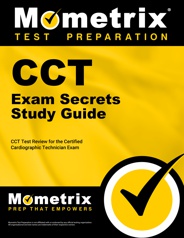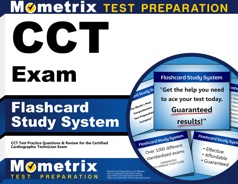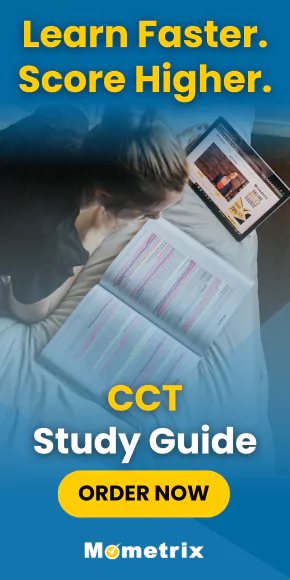The Certified Cardiographic Technician (CCT) exam, provided by Cardiovascular Credentialing International (CCI), is taken by professionals who wish to become certified as a CCT, which would allow you to work with ECGs, Holter Monitoring, and stress testing.
Click “Start Test” above to take a free CCT practice test!
CCT Exam Eligibility
To be eligible to take the CCT exam, you must have a high school diploma or GED. You must also meet at least one of the requirements listed below and provide documentation that proves you have met the requirement(s).
Qualification Prerequisites
CCT1
You must be currently enrolled as a student or graduate of a cardiovascular or allied health training program.
Supporting documentation
- A completion certificate
OR - A student verification letter
OR - Educational transcripts
CCT2
You must be currently employed or previously employed in the cardiovascular technology field or a recognized allied health field.
Supporting documentation
- An employment verification letter
CCT3
You must have completed a graduate or undergraduate degree from a recognized institution in a field related to science or physical health.
Supporting documentation
- A completion certificate
OR - A student verification letter
OR - Educational transcripts
CCT Exam Outline
The CCT exam contains 130 questions, 20 of which are unscored, and the time limit is 2 hours. The 20 unscored questions are used by the administrators to evaluate questions for future versions of the exam. These questions are unmarked and mixed in with the scored questions, so you will not know which questions are scored or unscored.
Exam Contents
The exam is split into five content categories, and each category contains its own set of tasks:
1. Conducting Pre-procedural Activities (10%)
- Confirm equipment maintenance, calibration, and cleaning
- Apply universal and isolation precautions
- Verify the physician’s orders
- Perform patient transport and transfer
- Provide patient education
- Verify patient identifiers
- Identify proper anatomical landmarks
- Prepare the patient
- Obtain patient consent
- Identify safety considerations and potential hazards
2. Performing ECG (39%)
- Gather ECG supplies and equipment
- Perform standard 12-lead ECG, modified ECG, 15-lead ECG, and pediatric ECG
- Troubleshoot
- Correlate ECG morphology with anatomy and physiology
- Recognize axis deviations
- Identify ischemic changes
- Identify hypertrophy
- Recognize Bundle Branch Blocks
3. Performing Stress Tests (10%)
- Gather stress test equipment and supplies
- Perform stress test protocol
- Demonstrate knowledge of stress test equipment
- Demonstrate knowledge of nuclear and pharmacological stress test protocols
4. Performing Ambulatory Monitoring (4%)
- Gather ambulatory monitoring equipment and supplies
- Verify functionality of the equipment pre- and post-application
- Attach leads to the patient
- Troubleshoot ambulatory monitoring equipment and procedure
5. Performing Rhythm Analysis (37%)
- Analyze the following rhythm data:
- Sinus
- Atrial
- Junctional
- Heart blocks
- Ventricular
- Pacemaker
- Communicate obtained data
- Correlate ECG findings
- Identify types of artifact and life-threatening arrhythmias
- Identify different classes of general cardiovascular medications
Areas of Knowledge
You will be expected to understand the following general areas of knowledge in relation to the above activities:
- Heart and its parts
- Blood flow
- Arteries
- Veins
- Capillaries
- Arterioles
- Venules
- Pressures
- Cardiac valve function
- Relationship of cardiac output to heart rate and stroke volume
- Control mechanisms
- Cardiac cycle
- Waveforms
- Normal values
- ECG measurement
- Einthoven’s triangle and law
- ECG calibration methods
- Bipolar, unipolar, and precordial leads
- Single- and three-channel ECG
- Troubleshooting ECGs
- Standardization
- Paper speed
- Lead placement
- Electrical interference
- Somatic tremor
Check out Mometrix's CCT Study Guide
Get practice questions, video tutorials, and detailed study lessons
Get Your Study Guide
Registration
The CCT exam can be taken at one of over 230 Pearson Professional Centers located around the country and over 3,000 international locations.
To register, you must first create an online CCI account. Once your account has been created, you will be able to select your exam and which qualifying prerequisite you fall under. You will then be asked to fill in and upload any necessary personal information and documents, such as a copy of a government-issued photo ID. Finally, you will be asked to submit the $175 exam fee.
Once your application has been approved, you will be sent an Authorization to Test (ATT) letter. You will have a 90-day window once this is received to schedule and take the exam.
Test Day
You should arrive at the testing center no later than 30 minutes before your scheduled exam time. If you show up late, you will not be allowed to test and will forfeit your application fees.
Once you arrive, you will be asked to present two forms of identification. You will need a primary one with your full name, signature, and a recognizable photo. Your secondary ID must have your name and signature.
This is a computer-administered exam, so you will not need to bring any personal items such as pencils, paper, study materials, or even calculators with you. If you do bring such items, you will be asked to leave them in a secure locker outside the testing room before the exam begins.
CCT Scoring
You will receive an unofficial score report at the testing site. This will include your pass/fail status, a total score, and a percentage of correct questions in each section.
Scores are scaled from 0 to 900, and a total scaled score of 650 is needed to pass. The number of correct answers required to achieve the passing score was determined by a standard-setting study run by CCI panelists and experts.
If you passed the exam, you will receive an official results letter and wallet card about three weeks after completing the exam.
Retaking the Exam
If you did not pass the exam and wish to retake it, you must wait 45 days before submitting a new application.
Check out Mometrix's CCT Flashcards
Get complex subjects broken down into easily understandable concepts
Get Your Flashcards
Study Tips
How to Study Effectively
Your success on CCT test day depends not only on how many hours you put into preparing but also on whether you prepared the right way. It’s good to check along the way to see whether your studying is paying off. One of the most effective ways to do this is by taking CCT practice tests to evaluate your progress. Practice tests are useful because they show exactly where you need to improve. Every time you take a free CCT exam practice test, pay special attention to these three groups of questions:
- The questions you got wrong
- The ones you had to guess on, even if you guessed right
- The ones you found difficult or slow to work through
This will show you exactly what your weak areas are and where you need to devote more study time. Ask yourself why each of these questions gave you trouble. Was it because you didn’t understand the material? Was it because you didn’t remember the vocabulary? Do you need more repetitions on this type of question to build speed and confidence? Dig into those questions and figure out how you can strengthen your weak areas as you go back to review the material.
Answer Explanations
Additionally, many CCT practice tests have a section explaining the answer choices. It can be tempting to read the explanation and think that you now have a good understanding of the concept. However, an explanation likely only covers part of the question’s broader context. Even if the explanation makes sense, go back and investigate every concept related to the question until you’re positive you have a thorough understanding.
Comprehend Each Topic
As you go along, keep in mind that the CCT practice test is just that: practice. Memorizing these questions and answers will not be very helpful on the actual test because it is unlikely to have any of the same exact questions. If you only know the right answers to the sample questions, you won’t be prepared for the real thing. Study the concepts until you understand them fully, and then you’ll be able to answer any question that shows up on the test.
Strategy for CCT Practice
When you’re ready to start taking practice tests, follow this strategy:
- Remove Limitations. Take the first test with no time constraints and with your notes and CCT study guide handy. Take your time and focus on applying the strategies you’ve learned.
- Time Yourself. Take the second practice test “open book” as well, but set a timer and practice pacing yourself to finish in time.
- Simulate Test Day. Take any other practice tests as if it were test day. Set a timer and put away your study materials. Sit at a table or desk in a quiet room, imagine yourself at the testing center, and answer questions as quickly and accurately as possible.
- Keep Practicing. Keep taking practice tests on a regular basis until you run out of practice tests or it’s time for the actual test. Your mind will be ready for the schedule and stress of test day, and you’ll be able to focus on recalling the material you’ve learned.
FAQs
Q
How many questions are on the CCT exam?
A
There are 130 questions on the exam, 20 of which are unscored.
Q
What types of questions are on the CCT exam?
A
Exams administered by CCI contain some mix of these question types:
- Multiple-choice: You must select one correct answer from a list of four given answer choices.
- Multiple-response: You must select 2-3 correct answers from a list of six given answer choices.
- Hot Spot: You must click on a single specific region of a given image.
- Drag-and-place: You must drag a group of tokens into specific areas on a given image.
Q
How long is the CCT exam?
A
The time limit for this exam is 2 hours.
Q
What is the passing score for the CCT exam?
A
To pass the exam, you must achieve a scaled score of 650.
Q
How much does the CCT exam cost?
A
The examination fee for this exam is $175.
Mometrix Test Preparation is not affiliated with or endorsed by any official testing organization. All organizational and test names are trademarks of their respective owners.


